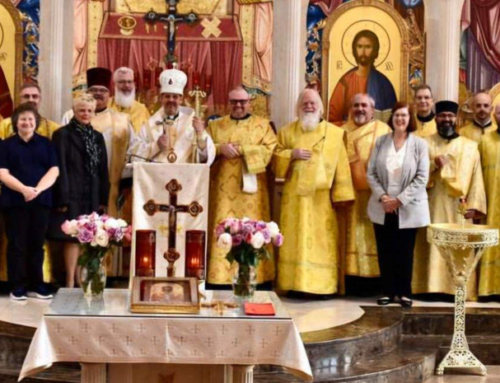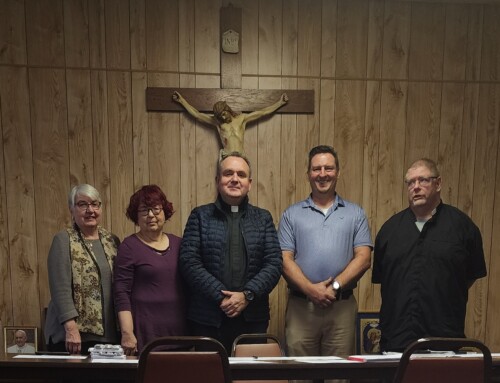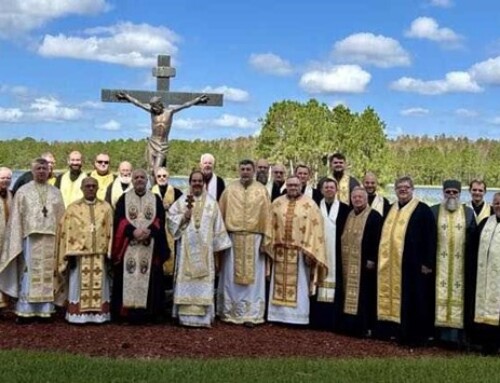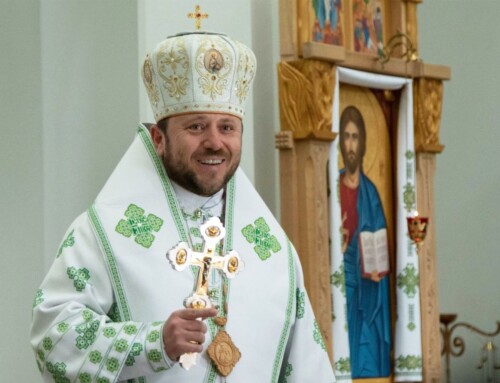Ongoing Diaconal formation guided by His Grace Bishop Bohdan (Danylo) was evident during the weekend of September 20th to 22th, when Deacons and Deacon candidates from the St. Josaphat Eparchy with their wives gathered at the Jesuit Retreat House in Parma, OH, for the annual Diaconate Ongoing Formation Weekend. This year’s Retreat Masters were Fr. Ivan Chirovsky, who is currently serving as Adjunct Professor in Spirituality at SS. Cyril and Methodius Byzantine Seminary in Pittsburgh, PA, along with his wife, Pani Maria, who is a hospital chaplain. The theme of the weekend program was “Mercy of God and Me.” Participants traveled from Pennsylvania (Pittsburgh and Ebensburg), Ohio (Parma) North Carolina (Raleigh) areas.
The weekend program was packed with prayer, reflection and retreat sessions. The Divine Office was prayed including, Compline, Matins and Vespers, reflecting on the Light of Christ and His Righteousness and Mercy in the world. Saturday, after the second retreat session, the group joined the pilgrimage to the Shrine of the Holy Cross at Holy Trinity Ukrainian Catholic Church in nearby Youngstown, for the Hierarchical Divine Liturgy in celebration of the Saturday after the Exaltation of the Holy Cross.
Accompanying the prayer services were the retreat sessions. These sessions, led by Fr. Ivan, reflected on God’s mercy, and its role in our lives. In Eph. 4:15-17, St. Paul tells us that we are to proclaim “the truth in love, we are to grow up in every way into him who is the head, into Christ, from whom the whole body, joined and knit together by every joint with which it is supplied, when each part is working properly, makes bodily growth and upbuilds itself in love. … you must no longer live as the Gentiles do, in the futility of their minds.” At the First Conference, we explored how, normally, we become aware of God as Truth (Jn. 14:6) by His and our own acts of justice, sometimes translated as righteousness; and, our consciousness of God as Love (1 John 4:8) grows with each of His and our own acts of mercy. It is the world’s “futility of mind” which often discusses justice and mercy as opposites. But you don’t have to skimp on or destroy or delete or diminish or re-adjust or re-define justice or righteousness, in modern times or in any other age, in order to be merciful, so as to know the love of God. That is simply bad theology and morally wrong!!!! For us Christians justice and mercy go hand in hand with one another. Mercy is God’s steadfast love for us. The opposite of mercy is to be deficient in goodness, graciousness, kindness, generosity, and “suffering with the other:” (i.e. compassion). There is no deficiency of justice in mercy. Just as we must learn to speak the truth in love, so also we must learn how to be both just and merciful. As we move from sin to virtue, from being stiff-necked to repentant, from wondering where God is in this world to noticing even the smallest help or grace which the Holy Spirit provides us daily, we discover that there are things that block or sabotage our efforts at righteousness and mercy. Through Christ and the Holy Spirit (the “two hands of the Father” according to St. Irenaeus of Lyons) the Father extends a just and merciful hand, which we must take hold of in order to reap the full benefits of God’s truth and love. We must participate in our own salvation – we must assimilate God’s Goodness and Mercy which is His Love and God’s Righteousness which is His Truth. In our Ukrainian-Byzantine spirituality this assimilation is known as becoming “prepodobny” or “Most-Like” God.
Among the various things that can either block or sabotage our efforts at acquiring God’s righteousness and mercy, Fr. Ivan covered various spiritual needs. While remembering His mercy and love, we must not forget about Judgement Day: the problem is not whether or not God is merciful and steadfastly loving (God’s Real Self to me), but whether or not I am choosing to live in a such a way, truthful and righteous, that would make it possible for me to receive and embrace God’s mercy and love (my Real Self to God). For diakonia-service to be authentic, one must serve out one’s own identity and not out of someone else’s. It is therefore vital that our lifestyle, which is called repentance, be real, be our own. In the Second Conference, we explored what it means to be your real repentant self before God. We must avoid giving in to the temptation of placing limits on our service to God and service to neighbor, because we have joined ourselves to Christ in the Holy Mysteries of Initiation (Gal. 3:27) and He did not limit His offering of Himself to the Father. Imitating Christ, we offer ourselves up in a lifestyle which is an “all-encompassing worship” to the Lord (Rom. 12:1-5). Some scientists tell us that we are presented with as many as 4,000 thoughts in a typical sixteen-hour day. How can I repent, if I easily fall into the trap of believing everything I think, or I feel, or I want? The Fourth Conference, divided into two sessions (one after the Third and one on Sunday morning), defined some of these thoughts addressing questions like: when does a thought become a sin? If I join my feelings to a sinful suggestion, then the thought is no longer just a thought outside of me, but it becomes a part of me, of my desires, which I now seek to satisfy, and so I’ve started “creating” a sin. But that’s not all. A sin can become one of the “Eight Passions” (a teaching of the Eastern Fathers, which predates the Western “Seven Deadly Sins”). What are some of the many ways in which these addictions, or passions, destroy the soul, if they are left hidden or unchallenged by the Holy Mystery of Confession? Why does God allow us to have tempting or sinful thoughts, if they are so dangerous to us? How are we to understand God’s grace in all of these spiritual battles? These efforts along with many failings along the way can leave us exhausted and perhaps disillusioned. Pani Maria led a Third Conference for us to learn how it is quite natural for us to grow from childish idealization into teen or young adult disillusionment on the way towards adult maturity in our relationships with God, self and others. If we try to avoid the pain or prevent the vulnerability of disillusionment, we may get stuck and although the age of our body increases our spirit is unable to mature into the fullness of God’s truth and love. We fail to recognize pain and vulnerability as essential instruments in God’s hands, capable of leading us to “attain to the unity of the faith and of the knowledge of the Son of God, to mature manhood, to the measure of the stature of the fulness of Christ” (Eph. 4:13). She also led us in reflection on how to persevere in keeping God in our lives, followed by group discussion of the visceral experiences we have had of His mercy and love in our lives.
The weekend wrapped up with a beautiful Hierarchical Divine Liturgy with our Bishop Bohdan Danylo, Bishop Emeritus Robert Moskal and other clergy at St. Josaphat Cathedral, followed by a luncheon. Throughout the weekend, the brotherly and sisterly bonds of affection were deepened and strengthened between the Deacons, Deacon candidates, and their wives. They are already looking forward to next year’s retreat.
Do you think you have a call to the diaconate, the priesthood, or monastic life? Contact your local priest or deacon for more information and assistance in answering “Yes” to Christ.





